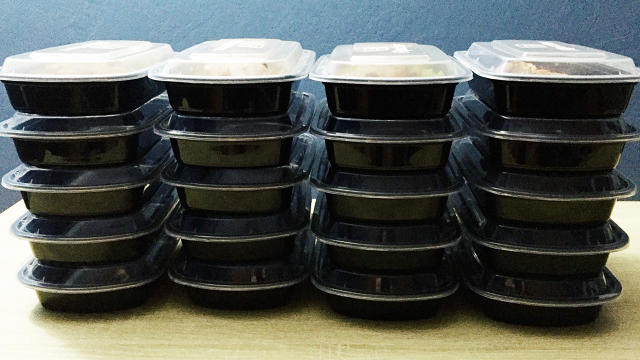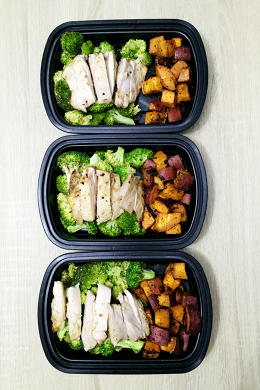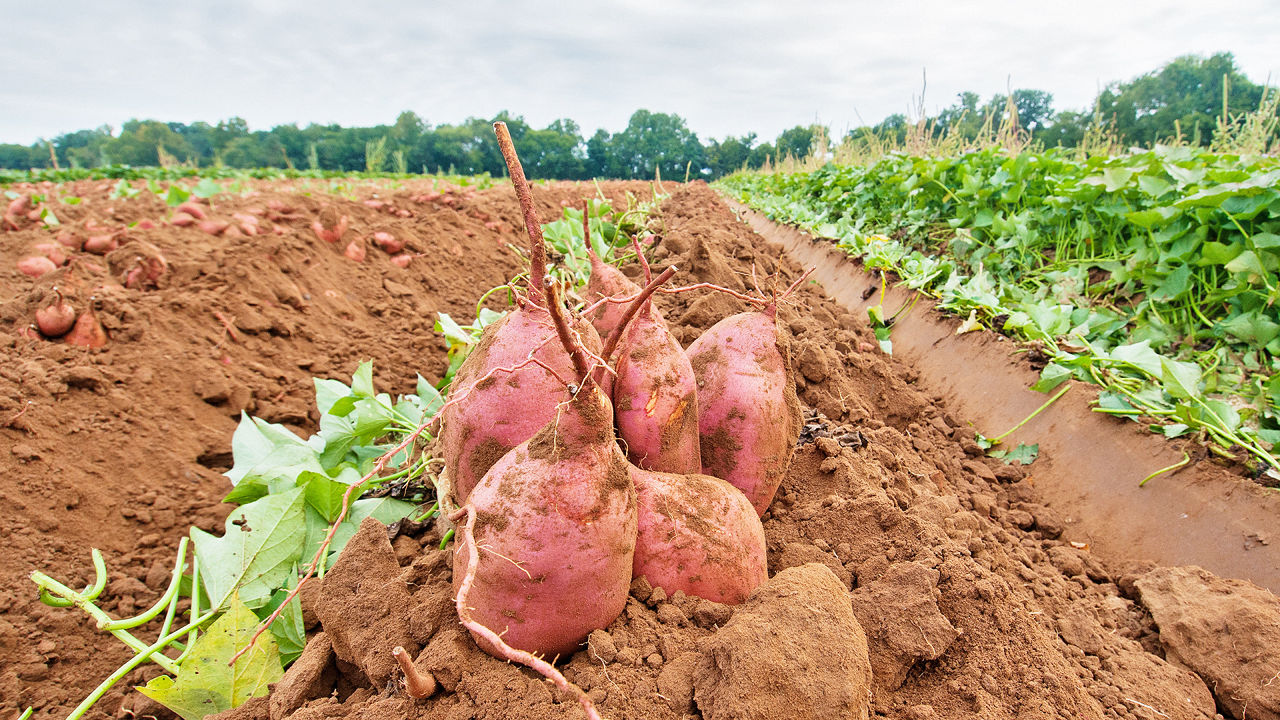This Y Combinator Startup Founder’s Surprising Productivity Secret? “Meal Prep”
Kevin Chan grew up eating poorly. He doesn’t blame anyone per se, but does note that he was the child of hardworking Chinese immigrants. When they cooked for him, which was rare, they served him “super carb-heavy and super saucy” Chinese food. Mostly, though, Chan was left to fend for himself. He chose fast food “almost every single meal.”
His eating habits while a college student at UC Berkeley were no better. Forget the “freshman 15”: Chan gained 35 pounds his first year. He felt sluggish. He went to bed late, and got up even later. He didn’t exercise. He looked on at athletic friends, who seemed to have good dietary, sleep, and exercise habits, with a bit of envy, but mostly skepticism. Some of them even had a strange habit of preparing all their meals for the week at once—something he could never imagine doing.

Senior year was “rock bottom,” says Chan: at 5-foot-7, he weighed almost 200 pounds. He “slept a ton.” He was groggy, unfocused. Food distracted him from his work: He was always wondering about his next meal.
After graduating from college a few years ago, Chan moved to New York, and decided he had to change his habits. For a year, he indeed made a few improvements. He started working out regularly. And he developed a habit, during the workweek, of drinking nothing but green smoothies, sometimes adding protein powder. Meanwhile, Chan cofounded an apparel company called ASPECD.
But after about a year, Chan still wasn’t happy with his business or with his eating habits, which he increasingly felt were related. Though he was losing weight and saving time spent on eating by becoming a smoothie junkie, he knew from poking around various websites that he wasn’t really balancing his nutrition properly. He continued to sleep late, sometimes rising at 11 a.m. on a weekday. And meanwhile, ASPECD was struggling to get funding; by early 2015, a number of VC’s had passed.
But one day in early 2015, Chan and his cofounders got big news. Y Combinator liked their idea for another business, Maderight, which would help apparel companies interface with a network of Chinese factories.
Now they were in the hottest startup accelerator in the world. So Chan and his colleagues packed their bags, and booked flights for San Francisco.
It was in midair, passing across time zones, that Chan decided to reinvent himself. On the East Coast, he had been the cofounder of a struggling startup and someone who was only half in control of his eating habits and his schedule. But he was a Y Combinator founder now. And his days, he knew, were about to get a lot more busy.

So on the flight, Chan took out a pen and scrap of paper and wrote himself a wildly ambitious schedule. It looked something like this:
- 5:00 a.m.: Wake up
Granted, 5 a.m. seemed like a crazily ambitious wakeup time for someone like him, but Chan knew people who did it. If he couldn’t make it work while catching a wave of JFK-SFO jet lag, when could he make it work? Next, he wrote out his goals for a morning workout:
- 6:00 a.m.: Begin workout routine
- 7:00 a.m.: Protein shake
- 7:15 a.m.: Shower
By around 7:45 a.m., he wrote next, he wanted to be sitting down to work. But as for how he intended to break up that workday, he didn’t write quite what you’d expect:
- 8:00 a.m.: Coffee
- 9:00 a.m.: Banana
- 9:30 a.m.: Apple
- 10:00 a.m.: Yogurt
- 11:00 a.m.: Meal #1
- 1:00 p.m.: Meal #2
- 3:00 p.m.: Yogurt
- 4:00 p.m.: Meal #3
- 5:45 p.m.: Meal #4
- 9:00 p.m.: Arrive home
- 9:30 p.m.: Shower
Looking back, Chan admits it’s curious that in devising a schedule for his new workday, he didn’t structure it around work—but around food. But he knew that for him, at least, the questions of how he fueled himself and how productive he could be were intimately related. He felt that if he could solve the problem of how and when he fed himself, the rest would follow.
“For me, food is always a big time waster if it’s not already set,” he says. “I’m always thinking about food if I don’t know what I’m going to eat next.”
Chan concluded his Monday-through-Friday thusly, for good measure:
- 10:00 p.m.: Watch YouTube until I fall asleep.
Chan landed in San Francisco determined to be different. The biggest challenge he now faced? Figuring out those four unspecified “meals” he listed on his schedule beginning at 11, in a way that minimized time and money spent. His plan was to become like those athletes he’d looked askance at in college.
He was going to step into the world of “meal prep.”

His first San Francisco Sunday, Chan went to Safeway on a mission. He left with 150 dollars’ worth of three things: chicken, broccoli, and sweet potatoes. His goal? To make 20 meals for the workweek—each composed of 100 grams of potatoes, 150 grams of chicken, and 250 grams of vegetables.
Around 6 p.m., Chan started cooking. Using the oven and the stove, he improvised and stumbled. He cooked in large batches, but he never imagined how long it would take to cook all that food. His housemates walked in and out, baffled by Chan’s project.
It took him until 11 p.m. to cook and portion out all that food intro Pyrex containers.
But the time he spent on Sunday was time he saved during the week. While his colleagues spent the week visiting the supermarket sporadically, dipping into cafes, or consulting Yelp for sandwich shops only to find them closed, Chan worked. And he allowed himself to enjoy eating whatever he wanted during the weekend.

The first week’s experiment was a success, so Chan repeated it. Then he repeated it the next week, and the next. Soon, he gained efficiencies in his cooking. Now he uses a stopwatch, and only one cooking method: baking. Chicken goes in and out on 15-minute cycles; veggies and potatoes go in and out on 10-minute cycles. (Veggies are either broccoli, Brussels sprouts, string beans, or snap peas.) After about 90 minutes of cooking, he’s done. (Chan has also managed to adhere to his early wakeup time and workout routine—the jet lag trick worked.)
Together with shopping, preparation, and portioning (he eventually ditched the Pyrex in favor of dishwasher-safe, microwavable plastic containers), meal prep takes about four hours out of Chan’s Sunday. He thinks if he were to cook every night, he’d easily spend twice or even three times that much time over the course of the week.
Chan has anticipated all your objections. Doesn’t he get tired of eating the same thing every day? He feels that not every meal in life has to be a consummate aesthetic experience—and now he says he enjoys his weekend indulgences at restaurants even more than he used to.
Wouldn’t Soylent be easier? He looked into it, but says he thinks he spends less per meal and gets a mix of nutrients that better suit him using his method.
What about social eating? He tries to steer such meals, and dates, to the weekend—but he’ll make the occasional exception, as he did for Y Combinator’s Tuesday dinners, or recently for a special person.
Is he getting all the nutrition he needs? Over time, he’s added a number of supplements to his meals, including cod liver oil, beet powder, and ascorbic acid, which he washes down with a small amount of apple cider vinegar each morning. They seem to be fueling him well enough: The young man who flirted with obesity just a few years back is now competing in marathons and triathlons.
“It’s working pretty well,” he says. “For the foreseeable future, I’m probably going to stick to this.”
Chan eventually moved in with two of his cofounders. They thought Chan was crazy when they first witnessed his cooking routine. But now they do weekly meal prep, too.
Fast Company , Read Full Story
(12)



